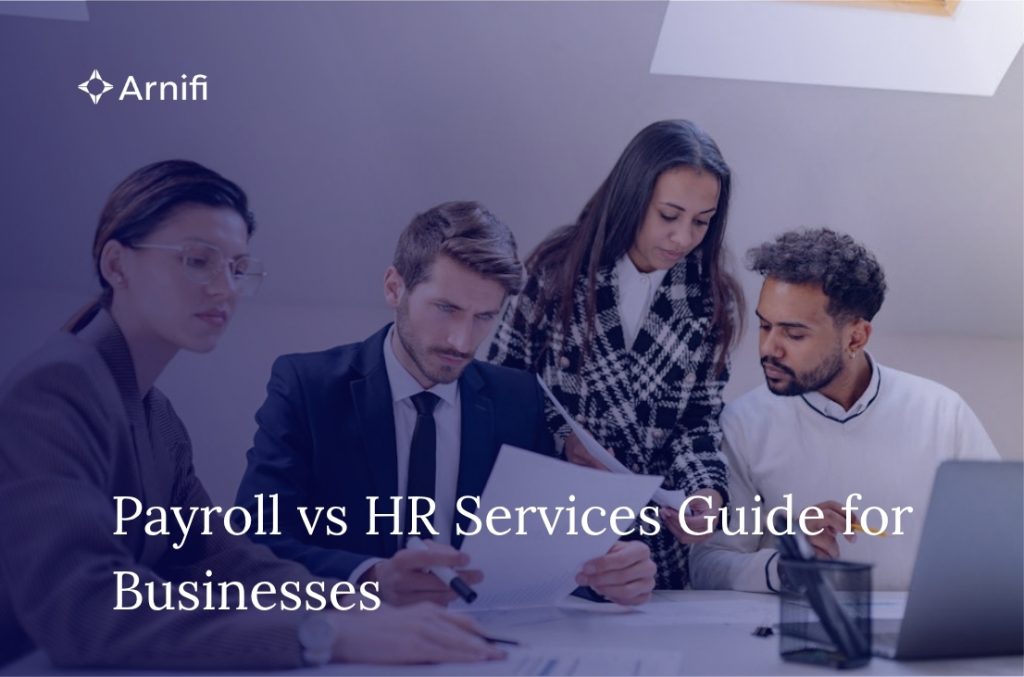Payroll vs HR Services | The Complete Guide to Understanding the Real Difference
by Rifa S Laskar Nov 20, 2025  5 MIN READ
5 MIN READ

Trying to understand the difference between payroll and HR services so you can choose the right support for your company? This article breaks down both functions in plain language, shows how they compare, and helps you decide what to outsource without wasting money or time.
Table of contents
- 1. Introduction
- 2. What Are Payroll Services?
- 3. What Are HR Services?
- 4. Payroll vs HR Services | The Core Differences
- 5. Why Businesses Often Outsource These Services
- 6. Payroll and HR | How They Work Together
- 7. Common Mistakes Companies Make
- 8. Choosing the Right Solution for Your Business
- 9. Conclusion
1. Introduction
The difference between payroll and HR services is something every business should understand early on. A company runs far easily when these two functions are viewed for what they are instead of being bundled together and pushed onto one overwhelmed staff member. Treating each area as its own system creates clarity on what needs outsourcing, what should stay internal, and which compliance risks need attention. Once the roles are separated, operations stop draining time and money on avoidable mistakes.
2. What Are Payroll Services?
Payroll services handle the money side of your people operations. Think of them as the engine that ensures every employee is paid the right amount, on time, and in a compliant way. It is not just salary calculation. True payroll support covers wages, allowances, overtime, leave salary, statutory deductions, WPS submissions, final settlements, and periodic reporting.
A payroll service is measured by accuracy and consistency. When it works well, you barely notice it. When it doesn’t, the entire company feels it. Employees lose trust, managers get frustrated, and compliance penalties show up out of nowhere. That’s why many businesses outsource payroll even before hiring an HR team. It’s numbers-driven, rules-driven, and time-sensitive.
3. What Are HR Services?
HR services deal with the people side of the business. Unlike payroll, HR is less about calculations and more about structure, behaviour, and long-term planning. A strong HR function sets the culture, creates policies that employees can actually follow, and keeps the workplace organised.
HR services typically include hiring, onboarding, performance management, employee relations, compliance with labour laws, training programs, and exit processes. Done well, HR improves morale, reduces turnover, and gives leaders space to focus on growth instead of people issues.
HR is strategic but payroll is transactional. But both are essential if you want stability, clarity, and accountability in your organisation.
4. Payroll vs HR Services | The Core Differences
| Aspect | Payroll Services | HR Services |
| Core Focus | Mathematics, documentation, salary processing, and legal compliance on payments | Policies, behaviour, culture, performance, training, and communication |
| Work Pattern | Fixed cycles (monthly, bi-weekly, weekly) | Continuous, unpredictable, driven by people-related needs |
| Nature of Work | Transactional and system-driven | Strategic, behavioural, and people-centric |
| Required Skill Set | Technical skills: calculations, software systems, WPS, compliance, regulations | Soft skills like empathy, clarity, structure, communication, conflict handling |
| Impact of Errors | Direct financial risk (wrong payments, compliance penalties) | Cultural and operational risk (low morale, conflicts, poor processes) |
| Dependency | Depends on accurate data, attendance, approvals, and legal rules | Depends on communication, policies, hiring needs, and company culture |
| Interchangeability | Not interchangeable, focused on numbers and compliance | Not interchangeable, focused on people and organisation building |
| Overall Summary | Ensures employees are paid accurately and legally | Ensures employees are supported, developed, and aligned with the company |
5. Why Businesses Often Outsource These Services
Most companies outsource because they don’t want compliance mistakes, legal exposure, or unhappy employees. Payroll outsourcing delivers accuracy and consistency, while HR outsourcing gives structure, policies, and guidance without the cost of a full internal team.
Startups outsource because they have limited staff. Mid-sized businesses outsource because scaling multiplies complexity. Large companies outsource to maintain neutrality and avoid internal bias in HR processes.
Outsourcing keeps operations clean and predictable. One clear benefit is that external specialists stay updated with labour laws and payroll rules long before most internal teams even hear about changes.
6. Payroll and HR | How They Work Together
Even though the difference between payroll and HR services is significant but both the functions depend on each other. Payroll needs HR data like hiring dates, resignations, approved leaves, promotions, and disciplinary decisions whereas HR needs payroll data to track costs, compensation trends, and employee satisfaction.
When both functions communicate easily the employees feel supported. The salaries come on time, policies are clear, and managers don’t have to deal with the paperwork. When the two functions don’t communicate then everything messes up like wrong payslips, incorrect leave balances, inconsistent records, and frustrated staff. Strong coordination is the hidden backbone of any stable operations.
7. Common Mistakes Companies Make
One common mistake is mixing roles. Many businesses expect payroll clerks to manage HR issues, or they expect HR staff to run payroll without training. This leads to delays, errors, and burnout.
Another mistake is skipping documentation. Without proper records, both payroll and HR teams end up guessing, which creates compliance problems later.
Some companies also delay policy creation which leaves employees confused about leave rules, working hours, or entitlements. When policies are unclear, payroll becomes messy because no one knows what should be paid.
8. Choosing the Right Solution for Your Business
Start by analysing your actual needs. If your main pain point is salary accuracy and compliance, prioritise payroll support. If your challenges involve hiring, structure, culture, training, or performance, strengthen your HR.
Most businesses benefit from a mix of an outsourced payroll provider for precision and an HR professional for people focused strategy. Whatever you choose, just ensure that both the functions communicate clearly and use tools that sync the data.
The right blend saves time, prevents disputes, and supports long-term growth.
9. Conclusion
Understanding the difference between payroll and HR services helps you run a tighter, more organised company. Treat payroll as the financial backbone and HR as the people framework. When both functions are handled properly, your team works smoothly, your compliance stays clean, and your leadership has space to focus on what actually grows the business. If you want expert payroll and HR support without the hassle of building everything from scratch, Arnifi can step in and manage it for you accurate, organised, and built around your goals.
Top UAE Packages

Related Articles
Top UAE Packages



